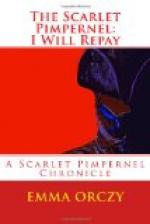Anon the Citizen-President rings a hand-bell, and there is a discordant noise of hoarse laughter and loud curses, some pushing, jolting, and swearing, as the general public is admitted into the hall.
Heaven save us! What a rabble!
Has humanity really such a scum?
Women with a single ragged kirtle and shift, through the interstices of which the naked, grime-covered flesh shows shamelessly: with bare legs, and feet thrust into heavy sabots, hair dishevelled, and evil, spirit-sodden faces: women without a semblance of womanhood, with shrivelled, barren breasts, and dry, parched lips, that have never known how to kiss. Women without emotion save that of hate, without desire, save for the satisfaction of hunger and thirst, and lust for revenge against their sisters less wretched, less unsexed than themselves. They crowd in, jostling one another, swarming into the front rows of the benches, where they can get a better view of the miserable victims about to be pilloried before them.
And the men without a semblance of manhood. Bent under the heavy care of their own degradation, dead to pity, to love, to chivalry; dead to all save an inordinate longing for the sight of blood.
And God help them all! for there were the children too. Children— save the mark!—with pallid, precocious little faces, pinched with the ravages of starvation, gazing with dim, filmy eyes on this world of rapacity and hideousness. Children who have seen death!
Oh, the horror of it! Not beautiful, peaceful death, a slumber or a dream, a loved parent or fond sister or brother lying all in white amidst a wealth of flowers, but death in its most awesome aspect, violent, lurid, horrible.
And now they stare around them with eager, greedy eyes, awaiting the amusement of the spectacle; gazing at the President, with his tall Phrygian cap; at the clerks wielding their indefatigable quill pens, writing, writing, writing; at the flickering lights, throwing clouds of sooty smoke, up to the dark ceiling above.
Then suddenly the eyes of one little mite—a poor, tiny midget not yet in her teens—alight on Paul Deroulede’s face, on the opposite side of the rooms.
“Tiens! Papa Deroulede!” she says, pointing an attenuated litte finger across at him, and turning eagerly to those around her, her eyes dilating in wishful recollection of a happy afternoon spent in Papa Deroulede’s house, with fine white bread to eat in plenty, and great jars of foaming milk.
He rouses himself from his apathy, and his great earnest eyes lose their look of agonised misery, as he responds to the greeting of the little one.
For one moment—oh! a mere fraction of a second—the squalid faces, the miserable, starved expressions of the crowd, soften at sight of him. There is a faint murmur among the women, which perhaps God’s recording angel registered as a blessing. Who knows?




